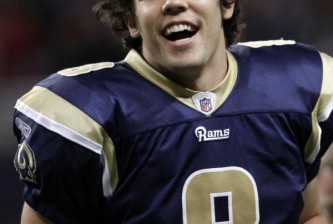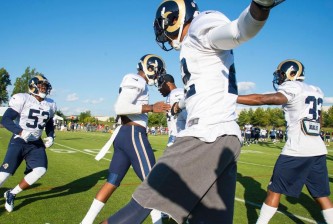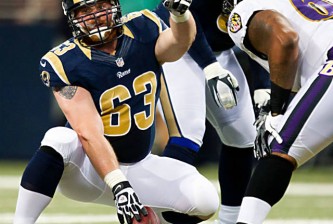 Greatest Ram ever? A case can be made.
Greatest Ram ever? A case can be made.Jim Thomas of the St Louis Post-Dispatch has penned a series of essential reads on Marshall Faulk, the keystone of the Greatest Show on Turf, who prepares for potential first-ballot Hall of Fame induction this Saturday. Here’s a set of testimonials and quotes, culled from Thomas and from the indispensible SI Vault, that illustrate this brilliant player and complicated man.
On the woeful state of the Rams’ offense, before Faulk arrived…
Late in the ’98 season, in an otherwise empty locker room at Rams Park, Carter and Farr desperately pleaded for playmakers on offense if the team was going to end its string of nine straight losing seasons. The infusion of offensive talent from the ’96 draft (Lawrence Phillips, Tony Banks, Eddie Kennison) had turned out to be a disaster.
The only positive to come out of this group was that John Shaw was able to deal Kennison away for a second-round draft pick; or nine tenths of the draft value it would cost to acquire Faulk.
Faulk, underappreciated in Indianapolis.
The Colts’ Marshall Faulk is having one of the greatest seasons a running back has ever had—yet it has gone virtually unnoticed…. Unfortunately for Faulk, the Colts are 3-11, the focus in Indianapolis is on Peyton Manning, and the Broncos’ Terrell Davis is having a runaway season.
— Peter King, SI
Faulk’s 1998 totaled 2,227 total yards from scrimmage — two more than Terrell Davis; however, Davis’ 23 touchdowns far eclipsed Faulk’s scoring in an underpowered Colts offense.
The trade that brought Faulk to St Louis…
“A Hall of Fame player for a second-rounder and fifth-rounder? You’d give your mother up for that kind of a trade. He was the missing link for our team. We didn’t have a running back at that point.”
— Former Rams VP of Player Personnel, Charlie Armey
According to Thomas, the Colts could have gotten more from either the Patriots or Dolphins, but Indianapolis GM Bill Polian was naturally hesitant to trade within their division (which in 1998 was the AFC East). And few other teams inquired, apparently shying away from a perceived prima donna who wanted to be paid — and treated — as an elite back.
Who were the Rams getting?
Players, coaches and staffers in St. Louis had heard the whispers—Faulk was a cancer at worst, a moody, me-first prima donna at best—and steeled themselves for the drama that was sure to unfold. What St. Louis got instead was perhaps the smartest, most talented and least selfish running back in the game.
Not only had Faulk begun to mature past his reputation, but a team’s perception of a player can be greatly colored by need, and nowhere was need greater than in St Louis. Thomas quotes Mike Martz as saying “I didn’t believe it. I thought it was a prank,” when the Rams acquired Faulk. And as Silver writes, Faulk’s influence on and off the field became essential to everything that Vermeil and Martz wanted to do.
Faulk’s immediate impact went beyond Xs and Os…
Martz was about halfway through the material when Faulk asked if he could interrupt. Sure, Martz replied. Faulk turned and chastised a couple of his new teammates for not taking notes. “Where’s your pencil? How come you’re not writing this stuff down? You’ve got to be kidding me. And we think we’re going to win here?”
— Faulk interrupts Mike Martz’s first meeting as Rams offensive coordinator.
As Thomas writes, the Rams had leaders and talent on defense prior to the 1999 season, but until Faulk arrived, sorely lacked that leadership capacity on offense. Faulk also helped settle Kurt Warner down in the team’s first practice after Trent Green’s preseason injury, paving the way for his natural ability to shine through, and for the Rams’ offense to explode.
“Obviously, Kurt Warner had a great season, an MVP season. But everybody on the team knew who our MVP was. And our team MVP was Marshall Faulk.”
— Rams CB Todd Lyght
An Unparalleled Career as a Ram…
Faulk was the greatest all-purpose back in NFL history. He’s the best receiver/RB in league history. From 1999 through 2001, the Rams scored 500+ points each year and Faulk had 44 percent of the team’s touches from scrimmage during that time. He had nearly 70 percent of the rushing yards. He caught more passes than Isaac Bruce or Torry Holt. He had more TD catches than Holt, and only five fewer than Bruce.
— Bernie Miklasz, who will be presenting the case for Faulk to the HOF voters.
The statistical accolades continue to pile up at Faulk’s feet, both old-school and new. As Doug Farrar writes for the Shutdown Corner, “When you factor in total yards from scrimmage, the stretch Faulk had from 1998 through 2001 was as productive a four-year stretch as any back has ever had in the NFL.” Farrar’s friends at Football Outsiders agree: “In 1999, he did the Roger Craig thing and gained over 1,000 yards both rushing and receiving. The next season was his greatest, as he finished first in DPAR, DVOA, Success Rate, and total touchdowns, and he won the NFL Most Valuable Player Award.” And for the 1999-2001 seasons, Faulk led the NFL in Pro-Football-Reference’s newly-developed “Approximate Value” stat, which quantifies total value to their team.
Waiting for the call from the Hall…
“If we’re talking about what I did on the football field, I feel like I have a damn good chance. I feel like I did all I could the 12 years that I played.”
— Faulk, on his chances of being elected to the HOF.
Many NFL analysts use terms like “slam-dunk” or “shoo-in” when talking about Faulk’s chances of Hall of Fame election, a rarity for a first-year player, and more effusive than will be the case for his teammates on the Greatest Show Rams. Debate continues about the candidacies of Kurt Warner, Isaac Bruce, and Torry Holt, and defensive teammate Aeneas Williams failed to make it to the final list of this year’s candidates.
As it stands, Faulk has a strong chance of being the first Rams “first-ballot” Hall of Famer since Eric Dickerson’s induction in 1999; perhaps only Dickerson stands in competition for the title of “greatest Ram ever.” Saturday’s expected enshrinement only adds to his case.






















